EN100:
Meeting Times, Location, & Course Delivery Details
Contact Information
- The Hunger Games and Catching Fire by Suzanne Collins (Scholastic Press)
Additional readings will be distributed in class.
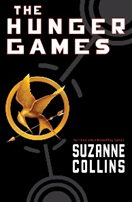
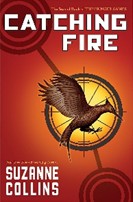
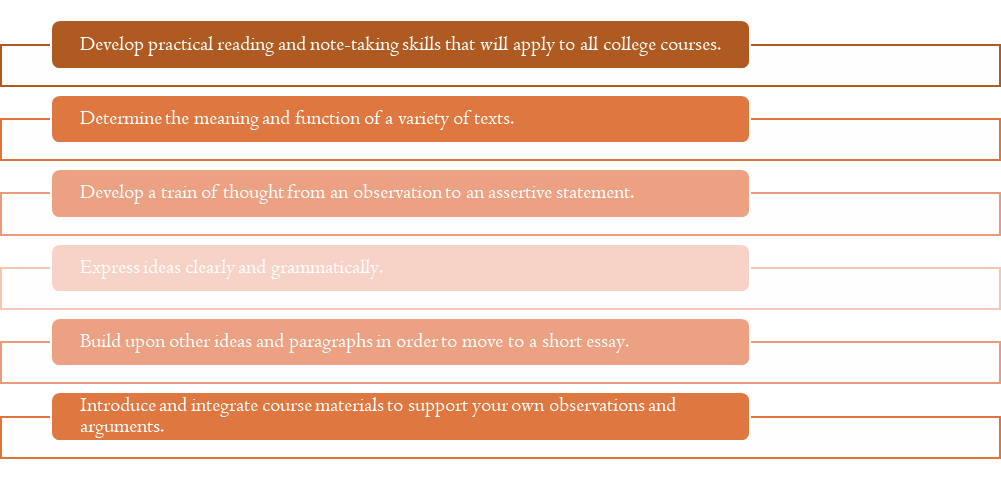
COURSE SCHEDULE
Date & Day | Readings to be done BEFORE class | Classwork | Writing & other assignments due for class today |
| M 8/18 | Intro’s, “Dystopia” diagnostic exercise on “Apocalypse” | ||
| W 8/20 | What is a literacy narrative? Definitions & components | Literacy narrative pre-write I | |
| F 8/22 | Literacy narrative drafting & troubleshooting | Literacy narrative pre-write II | |
| M 8/25 | Final drafting – Literacy narrative | Literacy narrative due by 5:00 pm on TUESDAY (short essay) | |
| W 8/27 | No class – Individual Conferences Weds, Thurs | Individual Conferences Weds, Thurs | |
| F 8/29 | Audience, Paragraph parts | Game, persuasive paragraph
| |
| M 9/1 | No class – Labor Day holiday
| ||
| W 9/3 | Argumentation & persuasion Paragraph parts Mechanics: Finishing a thought | Game, persuasive paragraph | |
| F 9/5 | In-class writing: audience & persuasion | In-class short argument (short essay) | |
| M 9/8 | Reading, “Rebellion In The Hunger Games” | Building a reverse outline | |
| W 9/10 | “Rebellion In The Hunger Games” | Reverse outline: points and evidence | |
| F 9/12 | Rome & its Gladiators, Introduction: The Hunger Games | Final reverse outline due via Blackboard (short essay) | |
| M 9/15 | The Hunger Games: Part I, chapters 1-5 | Literature: the people & their places | Quiz; reading journal entry |
| W 9/17 | The Hunger Games: Part I, chapters 6-9 | Mechanics: run-on’s and excessive comma (and semi-colon) love | Quiz; reading journal entry |
| F 9/19 | HG 1: Prewrite | journal entry | |
| M 9/22 | Into, Part II | Editing techniques | Hunger essay #1 due (short) |
| W 9/24 | Hunger: Part II, chapters 10-14 | Setting counts! | Reading journal |
| F 9/26 | Hunger: Part II, chapters 15-18 | Incorporating evidence Mechanics: sentence combining | Quiz; reading journal
|
| M 9/29 | HG II: Prewrite; argumentation | Reading journal | |
| W 10/1 | Beginnings and endings | ||
| F 10/3 | In-class essay | Hunger essay #2 due(short) | |
| M 10/6 | Hunger: Part III, chapters 19-25 | Literature: Conflict & Resolution; long essay topics | Quiz; journal—one paragraph arguing the essay topic of your choice |
| W 10/8 | Hunger: Part III, chapters 26-end | Thesis tests & Evidence grid Mechanics Active Verbs | Quiz; Thesis due |
| R 10/10 | Planning & integrating: Revising thesis, focusing points | Topic sentence outline – due at end of class | Evidence grid due |
| M 10/13 | FALL BREAK/ FACULTY INSERVICE | ||
| W 10/15 | Building body paragraphs – workshop | ||
| F 10/17 | Individual conferences | Individual student conferences ON YOUR OWN: WRITING CENTER APPOINTMENT | Individual student conferences
|
| M 10/20 | Writer’s debriefing; Intro to Catching Fire
| Hunger final essay due (long): due via Blackboard by beginning of class | |
| W 10/22 | Catching Fire: Part 1: ch. 1-5 | Characters & setting | Quiz; journal |
| F 10/24 | Fire: Part I: chapters 6-9
| Revising Paragraphs, drafting essay | Quiz; journal |
| M 10/27 | Intro, Part II | Proofreading and paragraph development | Fire assignment Part I due (short) |
| W 10/29 | Fire: Part II: chapters 10-14 Conflict | Making new observations | Quiz; journal |
| F 10/ 31 | Fire: Part II: chapters 15-18 | Conflict & Resolution; observations & evidence grid, integrating evidence | Quiz; 3 thesis statements due
|
| M 11/3 | In-class essay | Fire essay #2 in class (short) | |
| W 11/5 | Fire: Part III: chapters 19-25
| Looking at longer paper topics | Quiz; journal |
| F 11/7 | Fire: Part III: chapters 26-end
| Thesis statements | Quiz; journal |
| M 11/10 | Topics & secondary sources | ||
| W 11/12 | Outlining | Thesis & evidence grid due
| |
| F 11/14 | Topics sentence outline & drafting | ||
| M 11/17 | Synthesis outline | ||
| W 11/19 | Rough draft 1 due | Rough draft 1 due | |
| F 11/21 | Conferences Thursday & Friday | Conferences Thursday & Friday
| |
| M 11/24 | Peer Review – full draft
| Full draft of final essay in hard copy for peer review | |
| W & F | TURKEY
| ||
| M 12/1 | Writer’s reflection, exam prep | Fire final essay due (long) via Blackboard by beginning of class | |
| W 12/3 | Writer’s reflection, exam prep |
See calendar and Blackboard
GRADING: Your grade will be comprised of the following elements:
Quizzes: 15%
Drafting & Mechanics exercises: 40%
Short essays: 20%
Long Essays: 25%
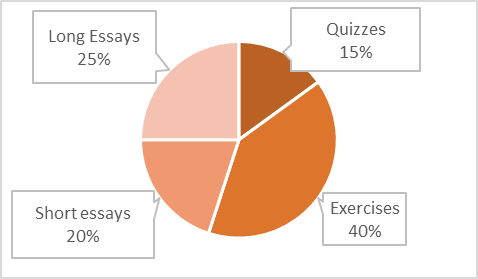
Grade Scale:
A | 93.5 < | B+ | 87 < | C+ | 77 < | D | 60 < |
A- | 90 < | B | 83.5 < | C | 73.5 < | F | > 59.9 |
|
| B- | 80 < | C- | 70 < |
|
|
Instructor Course Policies
Attendance: See the current Student Handbook for the college’s Academic Integrity policy especially as it pertains to excused absences.
Attendance is mandatory, as is punctuality. You get three “freebie” absences (for whatever reason) after that I will deduct 1 point from your final course grade for each additional absence.
- Absences do not excuse you from work that is due that day, or given that day for the next class meeting. For example, if you are absent on a day we do a pre-write activity you are still responsible for completing it, as well as for finding out any and all information that was missed on the day of your absence.
- Absences in excess of three weeks’ worth of class time will result in automatic failure of the course.
- Attendance implies more than physical presence in the room. Doing work for other classes, reading during discussions, checking email or playing games in lab, or any type of “resting” with the eyes closed will all be noted.
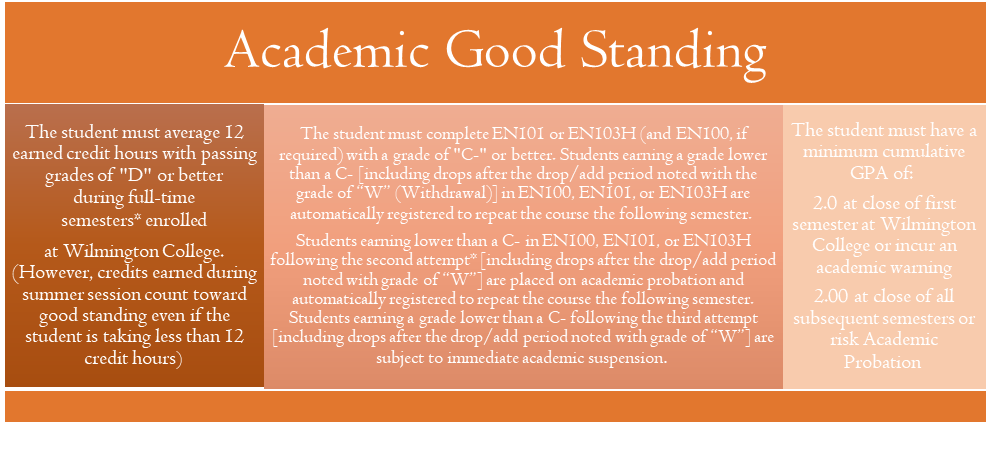
PLAGIARISM and other forms of Academic Misconduct: See the current Student Handbook for the college’s Academic Integrity policies as they pertain to examinations, plagiarism, classroom behavior, and the process for handling academic misconduct charges.
If you use someone's else's materials and are unsure of whether or not you are plagiarizing, play it safe and cite it just in case. Information that you find on the Internet must also be cited. For a complete guide on citing sources please see https://owl.purdue.edu/owl/research_and_citation/resources.html. If you are unsure about your usage, please come and see me!
Academic Offenses
No student shall engage in any form of improper or unethical conduct listed below. Furthermore, no student shall engage in any form of improper or unethical conduct designated as such by the faculty member teaching the course even though it is not specifically included in the listing below.
Examination offenses include, but are not limited to, the following:
- Taking unauthorized materials into or out of the examination room.
- Leaving the examination room without authorization before completing an examination.
- Talking in the examination room without authorization.
- Discussing the examination outside the examination room during the course of the examination.
- Attempting to observe the work of another student.
- Taking an examination for another person, or permitting someone else to do so.
- Collaborating improperly by discussion, joint research, or joint effort in any way expressly prohibited by the instructor.
- Using a cell phone, iPad or other electronic device.
Written work offenses include, but are not limited to, the following, which are expressly prohibited in the absence of prior written approval of the instructor or instructors involved:
- Resubmission of work – Submitting work which has been previously submitted for credit.
- Plagiarism – Submitting work done wholly or partly by another, including the unattributed copying of all or parts of a published work. Information available on the Internet is considered “published work” and must be cited appropriately.
- Prohibited sources – Consulting material or persons contrary to the directions of the instructor.
- Improper collaboration – Engaging in any discussion, joint research, or joint effort of a kind expressly prohibited by the instructor.
- Deception – Misrepresenting the authenticity of sources, citations, or principles in any written work.
- Other misconduct – Engaging in any other improper conduct as specified by the instructor.
Institutional and Program-Level Policies
All exams will follow the Final Exam Schedule. Students scheduled to take three or more final examinations on one day may request to arrange their examination schedule, so no more than two exams occur on one day.
Requests for early or late exams are considered only under extreme circumstances. Prior to the exam period, the student must file a written request on the Early/Late Exam Form available in the Student One Stop Center, Academic Records, and on the WC portal. The form must be signed by the Instructor and the Academic Dean, approving the alternate exam time. This process must be completed prior to the scheduled exam period.
Undergraduate: SP25 Final Exam Schedule Graduate:
Out-of-class Work Expectation A minimum of 2 hours of out-of-class student work is expected for each hour of in-class time for traditional face-to-face courses. For online and hybrid courses, the combination of face-to-face time and out-of-class work should be equal to 3 hours per credit hour per week. |
Instructional Course Delivery |
Academic Integrity Policy The use of generative AI is prohibited except where expressly allowed in assignment instructions. |
Class Attendance Policy |
Accessibility and Disability Services
Accessibility and Disability Services
Wilmington College provides accommodations and services for student with a variety of disabilities, including chronic illnesses, psychological, physical, medical, learning, and sensory disability amongst others. If you anticipate or experience barriers based on disability and feel you may need a reasonable accommodation to fulfill the essential functions of this course, you are encouraged to contact:
Spencer Izor, Associate Vice President of Compliance - Title IX/ADA Coordinator at spencer.izor@wilmington.edu or 937-481-2365 or Nathan Flack, Academic Resource Manager at 937-481-2208 to learn more about the process and procedures for requesting accommodations, or by visiting College Hall Room 306a or the Robinson Communication Center, Room 103.
Religious Accommodations
Wilmington College strives for an inclusive climate and welcomes students from all backgrounds, faiths, and experiences. If religious observance impedes your ability to participate fully in classroom activities or a principal holiday from your religious tradition occurs during the semester and conflicts with class meetings or activities, please make the professor aware of this immediately to determine if a reasonable accommodation is possible.
